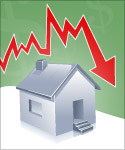The real estate market is a complex ecosystem, influenced by a myriad of factors ranging from economic policies to consumer behavior. One of the less obvious but significant factors that affect the real estate market is the fluctuation in gas prices. The impact of gas prices on real estate can be multifaceted and profound, influencing everything from the value of properties to the decisions of homebuyers and investors.
Rising Gas Prices: A Ripple Effect on Housing Affordability
As gas prices soar, the immediate effect felt by consumers is the increase in daily living costs. This escalation can lead to a decrease in disposable income, which in turn affects the ability of potential homebuyers to afford new properties. The additional financial burden can also influence the choices of homebuyers, potentially leading to a preference for properties closer to urban centers to minimize commuting costs. This shift in buyer preference can result in a change in demand dynamics, with suburban and rural properties possibly seeing a decrease in demand.
The Commuter's Dilemma: Location vs. Affordability
The increase in gas prices may also alter the perceived value of location when it comes to real estate. Properties that were once considered desirable due to their affordability, despite being located further from city centers, may lose their appeal as higher commuting costs diminish the cost benefits. Conversely, properties closer to major employment hubs may see an uptick in demand, potentially driving up prices in these areas.
Construction Costs and Housing Prices
The cost of construction is another aspect of the real estate market that is indirectly affected by gas prices. As transportation costs for materials rise, so does the overall cost of construction. This increase is often passed on to the consumer, resulting in higher housing prices. For developers, the increased costs could lead to a slowdown in new construction projects, which could exacerbate the issue of housing supply, especially in markets already facing shortages.
Long-Term Market Predictions
The long-term effects of rising gas prices on the real estate market are harder to predict. If high gas prices persist, they could lead to sustained changes in consumer behavior and preferences. This could result in a lasting impact on where people choose to live and the types of properties they desire. Additionally, if remote work continues to be prevalent, the necessity of living close to one's workplace may diminish, potentially leading to a reevaluation of property values based on location.
How to Mitigate the Impact of Gas Prices on Real Estate
The fluctuating nature of gas prices can have a significant impact on real estate investments. Here are some strategies that can be employed:
Energy Efficiency and Sustainability
One of the most effective ways to mitigate the impact of rising gas prices is by investing in energy efficiency. Properties that are energy-efficient tend to have lower operating costs, which can be particularly appealing when gas prices are high. Consider upgrades such as improved insulation, energy-efficient windows, and modern HVAC systems that can reduce energy consumption.
Location and Infrastructure
Investing in properties located in areas with robust public transportation options can be a wise move. These locations are often less affected by gas price fluctuations as residents and tenants have alternative commuting options. Additionally, properties close to amenities and employment centers can be more attractive, reducing the need for long commutes that are affected by gas prices.
Diversification
Diversifying your real estate portfolio can also help mitigate risks associated with gas price fluctuations. By investing in a variety of property types and locations, you can spread out the risk and ensure that your entire portfolio isn't affected by a single market change.
Technology and Innovation
Embracing technology can also play a role in mitigating the impact of gas prices. Smart home technologies and building management systems can optimize energy use and reduce costs. Moreover, investing in properties that support electric vehicle charging stations can be an attractive feature as the world shifts towards electric transportation.
Long-Term Planning
Consider the long-term implications of gas prices on your real estate investments. If high gas prices are here to stay, it may influence the types of properties that are in demand. Properties that cater to a more energy-conscious tenant may become more valuable over time.
Policy and Regulation Awareness
Stay informed about local and national policies related to energy and real estate. Policies that incentivize energy efficiency or renewable energy can provide opportunities for real estate investors to upgrade their properties and make them more competitive and resilient to gas price changes.
Conclusion
The relationship between gas prices and the real estate market is intricate and evolving. While rising gas prices present challenges, they also offer opportunities for innovation in housing solutions and urban planning. Real estate stakeholders, including buyers, sellers, and investors, must stay informed and adaptable to navigate the shifting landscape of the market.
Understanding these dynamics is crucial for anyone involved in the real estate industry or considering entering the housing market. By keeping a close eye on trends and being prepared to adjust strategies accordingly, one can make informed decisions that account for the influence of gas prices on real estate.




